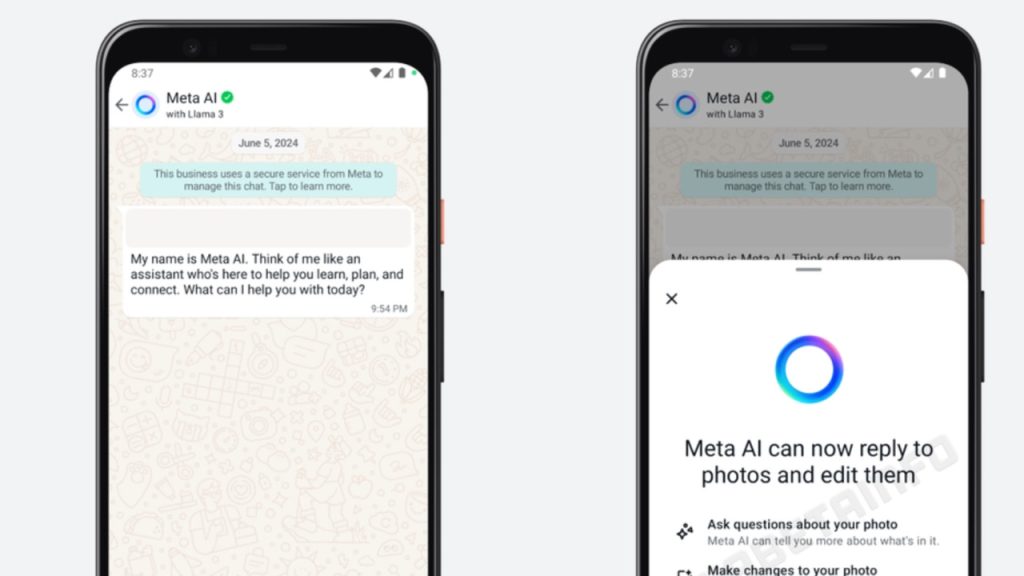WhatsApp’s Upcoming Meta AI Integration: A New Era of Image Interaction
WhatsApp, the popular messaging platform owned by Meta, is on the brink of introducing groundbreaking features that promise to revolutionize how users interact with images. According to recent reports from WABetaInfo, a trusted source for WhatsApp updates, the app is developing capabilities that will allow users to engage with Meta AI for image-related tasks, including analysis, editing, and even generation.
The New Image Sharing Feature
The most significant development spotted in WhatsApp Beta version 2.24.14.20 for Android is a new chat button that will enable users to share images directly with Meta AI. This feature is designed to enhance user interaction with visual content in several ways:
- Image Analysis: Users will be able to ask Meta AI to identify objects within shared photos or provide context about the image.
- Editing Capabilities: The AI will offer editing functions based on text prompts from users, potentially allowing for quick modifications without leaving the app.
- User Control: WhatsApp is expected to emphasize user privacy and control, allowing users to delete shared images at any time through Meta AI settings.
While the extent of editing capabilities remains unclear, this feature could range from simple adjustments to more complex AI-powered editing tools. The implementation of this functionality will require Meta to process and analyze uploaded photos, raising questions about data handling and privacy that the company will need to address.

AI-Generated Images and Avatars
In addition to image analysis and editing, WhatsApp is reportedly working on features that leverage Meta AI for image generation:
- Personalized Avatars: Users may soon be able to generate AI-created images of themselves by sharing a set of photos with Meta AI. The AI will analyze these images to create accurate representations of the user.
- Custom Scenarios: The feature is expected to allow users to generate images of themselves in various backgrounds and themes using text prompts.
- Activation Methods: Users can reportedly trigger this feature by typing “Imagine me” in a Meta AI conversation or by using “@Meta AI imagine me” in other chats.
These developments signify a significant expansion of Meta AI’s capabilities within WhatsApp, moving beyond text-based interactions to include sophisticated image-related functionalities.
Integration and User Experience
The integration of these AI-powered features into WhatsApp aims to enhance the user experience in several ways:
- Convenience: Users will be able to perform image-related tasks directly within the app, eliminating the need for external editing tools or AI services.
- Personalization: The ability to generate custom avatars and scenarios offers new ways for users to express themselves creatively.
- Efficiency: Quick edits and image analysis can streamline communication and information sharing within chats.
- Accessibility: By bringing advanced AI capabilities to a widely-used messaging platform, Meta is making these technologies more accessible to a broader audience.
Privacy and Control Considerations
As with any feature involving data processing and AI, privacy and user control are paramount concerns. WhatsApp is reportedly taking steps to address these issues:
- User Consent: The features will likely require explicit user activation and consent before processing any images.
- Data Control: Users will have the option to delete their setup images and generated content at any time.
- Conversation Privacy: When using AI image generation in group chats, Meta AI will reportedly not be able to read other messages in the conversation.
These measures aim to balance the benefits of AI integration with user privacy concerns, a critical consideration given WhatsApp’s emphasis on secure and private communication.

Potential Impact and Future Implications
The introduction of these AI-powered image features in WhatsApp could have far-reaching implications:
- Democratization of AI: By integrating advanced AI capabilities into a widely-used messaging app, Meta is bringing these technologies to a massive user base, potentially accelerating the adoption and normalization of AI in everyday communication.
- Competition in the Messaging Space: These features could give WhatsApp a competitive edge over other messaging platforms, potentially influencing industry trends and spurring similar developments from competitors.
- User Behavior and Expectations: As users become accustomed to having AI assistance for image-related tasks within their messaging app, it may shape expectations for digital communication tools more broadly.
- Data Collection and AI Training: The large-scale implementation of these features could provide Meta with valuable data to further refine and improve its AI models, potentially leading to even more advanced capabilities in the future.
- Ethical and Social Considerations: The ability to easily edit and generate realistic images raises questions about authenticity and the potential for misuse, which may necessitate new guidelines or features to address these concerns.

Development Status and Release Timeline
It’s important to note that these features are still in development and have been identified in beta versions of the app. As such, there is no confirmed timeline for when they will be available to the general public. The development process may involve further refinements, testing, and potentially even changes to the planned features before they are rolled out in a stable build.
The reported development of these AI-powered image features for WhatsApp represents a significant step in the evolution of messaging apps and the integration of AI into everyday communication tools. By bringing sophisticated image analysis, editing, and generation capabilities directly into one of the world’s most popular messaging platforms, Meta is poised to change how millions of users interact with visual content in their daily digital conversations.

As these features progress from development to potential public release, they are likely to generate considerable interest and discussion among users, tech enthusiasts, and industry observers alike. The success and reception of these features could serve as a bellwether for the future direction of AI integration in consumer-facing communication technologies.
Copyright©dhaka.ai
tags: Artificial Intelligence, Ai, Dhaka Ai, Ai In Bangladesh, Ai In Dhaka, Future of AI, Artificial Intelligence in Bangladesh, WhatsApp



